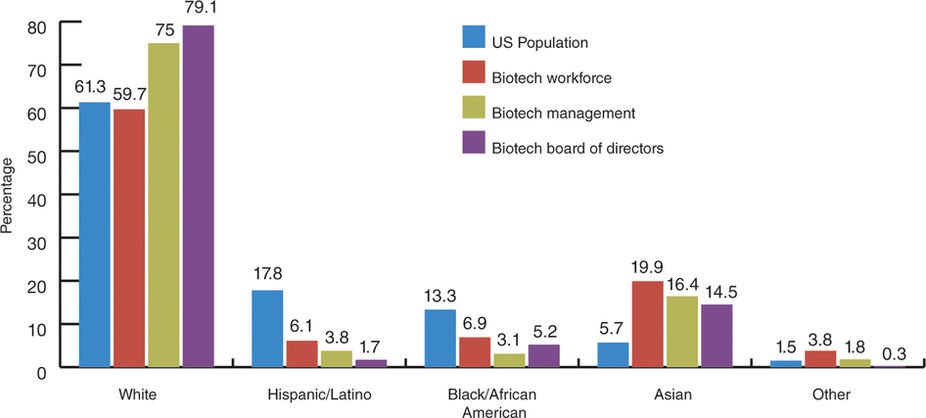Organizations within the life sciences industry increasingly recognize the importance of investing in diversity and inclusion as part of their overall growth strategy. It increases creativity, agility, and productivity. It improves employee recruitment and loyalty. It improves health outcomes for all patient populations.
Most importantly, the need to improve company diversity is clear, especially racial diversity. According to a survey conducted by Nature Biotechnology and BIO, minorities, especially Hispanics and African Americans are widely underrepresented in biotech sector as compared to their share of the U.S. population.

And to make things worse, according to MassBioEd’s 2018 Job Trends Report, not enough companies are taking concrete actions to improve their D&I:
- 29% of respondents stated that their companies had formal diversity initiatives – for either gender or race/ethnicity – at the contributor level; 28% at the management level. At the board level, the rate drops to only 17% of companies.
- About 60% of companies reported lacking any formal diversity initiatives.
During the recent MassBioEd Life Sciences Workforce Conference, a panel, Increasing Opportunities: What the Life Sciences Industry Can Do to Increase Diversity Within, explored what must be done at all levels of the education system and within industry to encourage a more diverse workforce to enter, grow, and thrive.
Participating in the discussion were:
- Travis McCready, President & CEO, Massachusetts Life Sciences Center (moderator)
- Vanecia Harrison-Sanders, Faculty Cooperative Education Coordinator, Northeastern University
- Jeffrey Herrera, Senior Associate, Global Diversity & Inclusion, Biogen
- Melodie Knowlton, Head, Vertex Learning Lab
- Joan Reede, Dean of Diversity, Director of Minority Faculty Development, Harvard Medical School
Throughout the hour-long discussion, there was broad consensus on multiple themes. First and foremost, the panelists all agreed that a lot more work must be done to ensure the next generation of life sciences workforce is made up of diverse populations – whether it be gender, race, or socioeconomic status. Further, panelists regularly remarked that it is critical for students to be exposed early in their education to STEM careers, to what those jobs look like, and to the education pathway to obtain those jobs – even starting this process as young as middle school.
It was even remarked that interest in STEM should start at home. For underrepresented groups, we need to develop programs to educate parents on STEM as well as build it into our students’ curriculum. With so many programs out there, panelists also agreed about the need to centralize program information and offerings into a ‘one-stop shop’ to streamline opportunities. And, continue to do so throughout college with internships and mentorships to make our STEM pipeline stronger and more competitive.
Exploring why it is so important to have a diverse workforce, panelists discussed such things as ensuring health equity for minority populations and missing out on a huge section of the talent pool necessary to fill future jobs. Putting a finer point on it, one panelist noted that for some diseases, minority populations make up the majority of patients with that disease. Scientists must represent those minority populations within companies.
When Travis concluded the program, he put the issue very succinctly: “We cannot stand by to allow thousands of jobs to go unfilled [because we’re not looking everywhere to fill those jobs]; we have the talent right here in the Commonwealth.”
Edie Stringfellow is MassBio's Director of Diversity & Inclusion. Connect with her here or @EdieStringfello on Twitter.